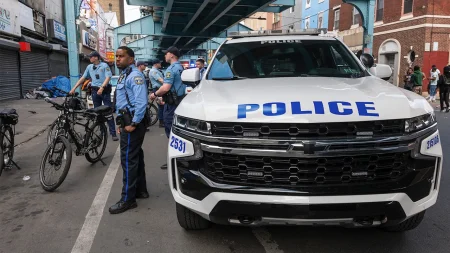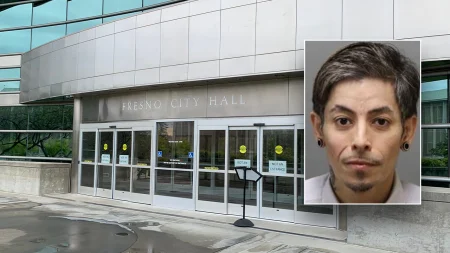On Monday, Devin Spraggins, 24, received a stern condemnation from Judge Kenneth Holder and was sentenced to 39 years to life imprisonment for the attempted murder of NYPD Officer Brett Boller. The incident occurred in April 2023 when Spraggins, involved in a dispute with a fellow passenger on a city bus, shot Officer Boller as he intervened. Despite the gravity of his actions, Spraggins remained silent during his sentencing, which was marked by the judge’s passionate remarks about the nature of the crime. Judge Holder made it clear that the most shocking aspect of Spraggins’s behavior was not just the shooting but his apparent lack of empathy when he attempted to fire at Officer Boller a second time, even as the officer lay on the ground in pain, indicating a chilling intent to kill.
The judge emphasized the sanctity of the role police officers play in society, noting that they risk their lives daily to protect all citizens, including those who may not appreciate their efforts. Holder pointedly referred to the irony of Spraggins’s actions, stating that on any given day, Officer Boller and his colleagues would have been willing to lay down their lives to help Spraggins’s own family, had the roles been reversed. This juxtaposition highlighted the judge’s belief that Spraggins’s attack was not only an affront to Officer Boller but also to the moral fabric of society, where law enforcement serves for the greater good, regardless of the perceived worthiness of the individuals they protect.
After the shooting, Officer Boller was promptly taken to a hospital, where he was reported to be in stable condition following treatment for a gunshot wound to the hip. Despite the injury being serious, the incident could have resulted in a far worse outcome. Spraggins’s reaction post-shooting was to evade responsibility; he fled the scene in a Lyft, which raises further questions about his character and decision-making. New York officials have stated that the conflict escalated rapidly when Spraggins confronted another bus passenger aggressively, prompting the bus driver to call for police assistance on the street.
NYPD Chief of Detectives James Essig recounted the initial exchange on the bus, explaining that Spraggins confronted another male passenger for “staring” and demanding that he vacate his seat, leading to a physical altercation that warranted police intervention. The circumstances surrounding the confrontation were indicative of Spraggins’s volatile nature, which ultimately resulted in grave consequences. By turning a verbal dispute into a violent encounter, Spraggins not only endangered Officer Boller but also put innocent bystanders on the bus at risk during this volatile incident.
As the legal proceedings came to a close, the significant prison sentence handed down by Judge Holder reflected the judiciary’s stance on gun violence and its impact on community safety. The decision served as both punishment and a deterrent, signaling that such behavior would not be tolerated. By handing down a lengthy sentence, the court aimed to convey the seriousness of the crime and the judicial system’s commitment to protecting law enforcement officers who face life-threatening situations daily in the line of duty.
In summary, the shooting incident exemplifies the challenges that law enforcement officers face while maintaining community safety. The gravity of Spraggins’s actions, which resulted in a serious injury to Officer Boller, was met with appropriate condemnation by the judicial system, designed to reinforce the dedication of police officers and ensure that those who attack them face significant consequences. The case serves as a stark reminder of the unpredictable nature of violence in urban environments and the crucial role that police officers play in preserving public safety amidst such dangers.











